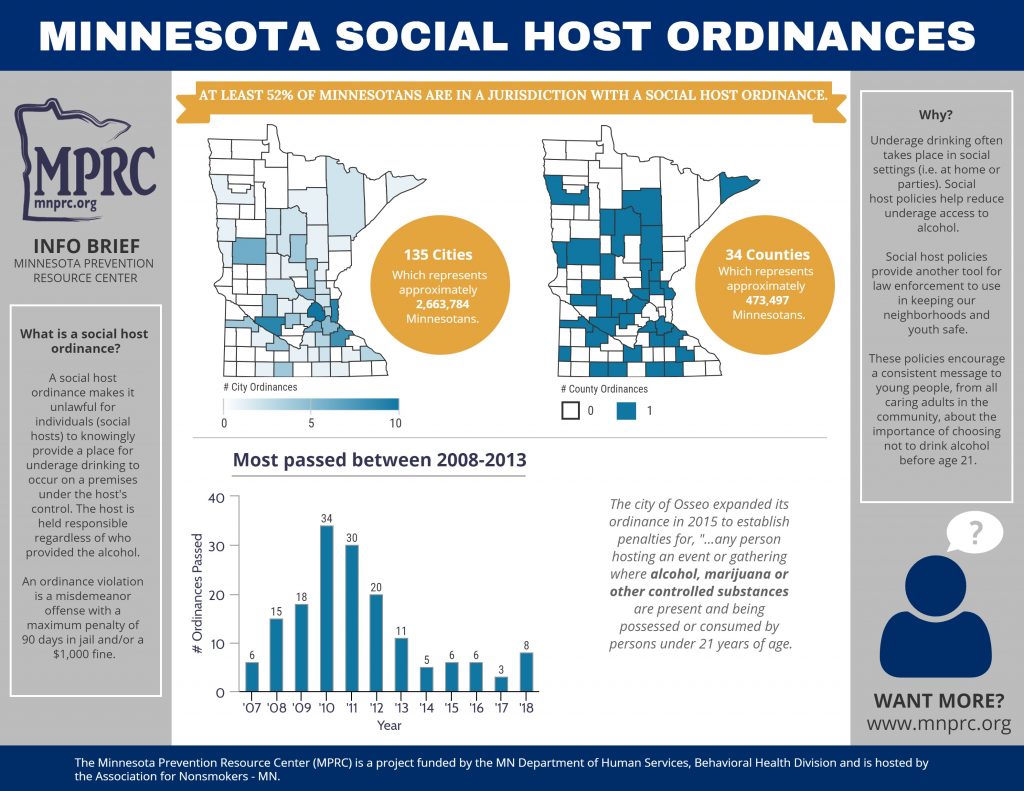Social Host Ordinance
One step in deterring underage drinking in Martin County
What is a Social Host Ordinance?
A Social Host Ordinance holds individuals (social hosts) criminally responsible for hosting or allowing an event on private or public property where persons under age 21 possess or consume alcohol, regardless of who supplies the alcohol to the minors.
Why has the ordinance been proposed?
The Minnesota Student Survey indicates that the vast majority of alcohol consumed by youth is provided by their friends, parents, other family members, or at parties, rather than the youth buying it themselves or taking it. Currently in Martin County, the youth is charged with possession or consumption of alcohol, but officers are often unable to identify who provided the alcohol. This ordinance will allow law enforcement to charge the individual who hosts the event.
Will adults be held responsible if they are unaware of underage drinking in their home or on their property?
Adults will not be legally responsible if they did not know, or did not have reason to know about the underage drinking. However, if the host knew or reasonably should have known about the party or gathering, knew or should have known that underage drinking was occurring, and the host did nothing to prevent it, he/she will be legally responsible.
A host is not criminally responsible if a youth sneaks alcohol that is available for adults at an event or gathering without the host’s knowledge.
The ordinance does not apply to conduct solely between an underage person and his or her parents while present in the parent’s household and does not apply to legally protected religious observances.
If an event occurs at a residence and the property owners/parents are not present and had no knowledge of the event where alcohol was consumed by underage drinkers, would the owners/parents be charged?
An ordinance can be written to make the owners/parents who were unaware of illegal alcohol consumption on their property while they were away from the residence not meet the definition of a host. However, an ordinance can be written to consider them a host if they are not present and it is identified that they supported the event by providing the alcohol or knew that the event was going to occur. Additionally, a family member of the property owner/parent who is at the event could be considered a host, regardless of their age.
Can a parent be charged if the parent allows their child to consume alcohol in the privacy of their own home?
A parent cannot be charged under a Social Host Ordinance if, in their presence, they allow their underage child to consume alcohol in their residence. Allowing someone else’s child to do so would be illegal. The parent is responsible for the safety and actions of their underage child.
Are there exceptions for graduation parties or other celebrations?
No.
Does a city or county have authority under state law to adopt a Social Host Ordinance?
Cities and counties are not granted general police powers, but have statutory authority to adopt and enforce this type of ordinance per Minnesota Statute 340A.509. This section preserves the power of local government to impose further restrictions and regulations regarding the sale and possession of alcoholic beverages within its limits. Additionally, Minnesota Statute 145A.05, subdivision 1 vests a city or county board with authority to adopt ordinances to regulate actual or potential threats to public health unless such ordinances are preempted by, in conflict with, or less restrictive than standards in state law or rule.
Doesn’t Minnesota already have a Social Host Law?
Minnesota Statute 340A.503 subdivision 2 makes it unlawful for any person to provide alcohol to a person under age 21.
Minnesota Statute 340A.801, subdivision 6, allows only civil actions against a social host over the age of 21 who knowingly provides alcohol to someone under age 21. The courts have ruled that allowing a party at a home where the owners/parents knew minors would consume alcohol, or by not taking the alcoholic beverages away from the minors, or by failing to stop the party, does not fall within the meaning of providing or furnishing alcohol to minors. These failed actions, or loopholes, are the basis of the need for Social Host Ordinances.
